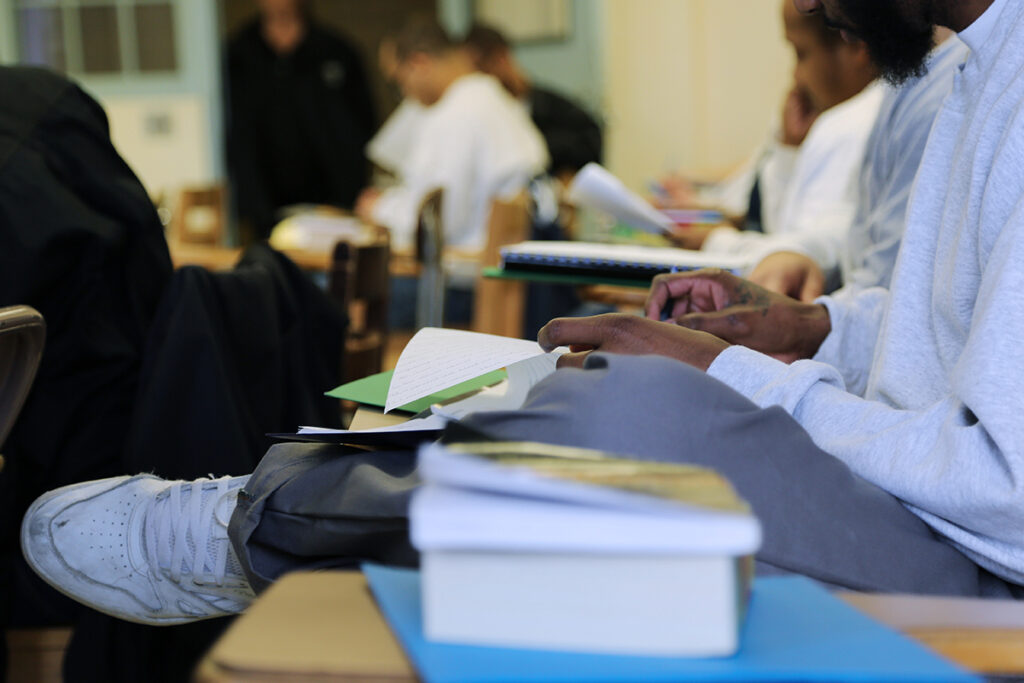EPI Students Win National Economic Essay Contest

A cohort of students in the Emerson Prison Initiative (EPI) won the Andrew Brimmer Undergraduate Essay Prize from the American Economic Association (AEA) for their essay, “Incarcerated Black Americans: The Forgotten Unemployed.”
This is the third year the AEA has awarded the prize, named for the first Black member of the Board of Governors of the Federal Reserve System and an expert on international monetary policy. The prize recognizes undergraduate essays that speak to the “economic well-being of Black Americans.”
“We are thrilled that EPI students have won this prestigious award. It is a testament to their hard work and their ability to work together as a team,” said Associate Professor Cara Moyer-Duncan, assistant director of EPI.
EPI, launched in 2017, is a degree-granting program for admitted students incarcerated at Massachusetts Correctional Institution at Concord, a medium-security men’s prison roughly 20 miles west of Boston. All EPI students work toward degrees in Media, Literature, and Culture, a major designed for the program. Recently, the program began offering a minor in Economics.
The students entered the contest at the suggestion of affiliated faculty member Sally Davidson, who teaches Economics within EPI. The students agreed to take on the challenge and worked hard to turn in a thoroughly researched, well-argued essay that impressed the judges at AEA.
“I think that their success shows that, even in an environment where there are significant barriers and challenges to education access and self-improvement, determination, cooperation, hard work, and intelligence can be recognized,” Davidson said. “Their award is a tremendous honor!”
The essay argues that while unemployment statistics can be a good proxy for economic well-being, they don’t, as currently compiled, give a complete picture of the financial disadvantages faced by Black Americans because they omit incarcerated Americans, 38 percent of whom are Black. As a result, both monetary policy and public spending are insufficient to create jobs and opportunities for everyone, especially for incarcerated individuals upon release.
“When the unemployment rate once reached the levels that are experienced among formerly incarcerated Americans today, the nation responded with the New Deal, and spent $653 billion (in 2009 dollars) to put Americans back to work,” the cohort wrote. “What would have been the result if half that sum was spent instead? While the situations are not exactly the same, this offers a helpful way to think about the effects of the inaccurate unemployment rate among Black Americans on the allocation of funding.”
The essay goes on to advocate for increased federal funding for college-in-prison programs, which is life-changing to those currently incarcerated, and has the potential to change the economic fortunes of those released from prison.
“[We] do realize that earning a college degree does not guarantee employment, but the unemployment rate for those with a BA is 1.9% (see Chart 3). While this number is not tied to race, it is important note that this level of unemployment is lower than the overall rate, a pattern I believe will hold true for Black Americans released from prison.”
The Economics minor came about in response to demand from EPI student themselves, Moyer-Duncan said.
“It is clear that their concentrated study in this area has equipped them with excellent analytical skills that enable them to effectively assess and convey the economic and social impact of racial inequities,” she said.
Categories